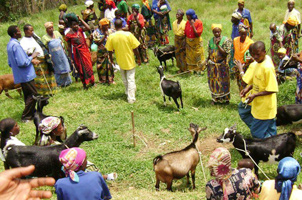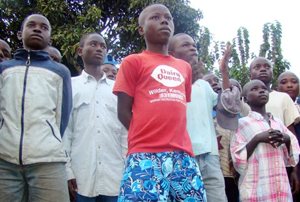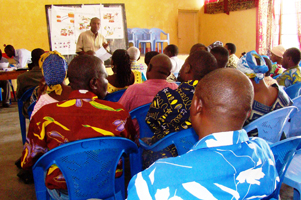Caritas works in eastern Democratic Republic of Congo by providing humanitarian relief to victims of the conflict through Caritas Goma.
Life as a survivor of sexual violence

Life as a survivor of sexual violence
In ten parishes, Caritas Goma has set up centres where rape victims can get help from psychologists.
“The most important part of my work is to give my patients hope and self-confidence. They can then obtain a microcredit,” said Frédéric Lulizene, a psychologist working in this programme. “If we don’t manage to do that, they will remain victims for life.”
Caritas employs “Justice and Peace” consultants in each parish. They encourage women to share their problems. Very often, rape victims don’t ask for help by fear of being stigmatized.
Sexual violence has become a major problem in Congo. Following to a survey from the United Nations, 8.000 women were raped in 2009 only in the East of the country.
The project is supported by Caritas Australia.
Life as a war returnee

Life as a war returnee
When they heard that the fights between the government and the rebels of the National Congress for the Defence of the People (CNDP) had ended, the people of Karambi, 100 kilometers north of Goma, decided to return to their homes.
Caritas Goma is helping 400 women from Karambi settle in and earn a living for their families after three years of exile. Many of them are victims of crimes. They are taught how to grow crops. Seeds, livestock and tools are distributed to help them start farming again.
The main objective of this project is to give 400 families confidence in their own capacities and help them get by independently.
The project was started in December 2009 with financial support from Caritas Australia and will go on for two years.
Life as a former child soldier

Life as a former child soldier
At least 120 boys aged 11 to 17, all of them former child soldiers, are currently hosted at the Center of transit and orientation (CTO) in Masisi, 86 kilometers west of Goma.
Thanks to professional help, the children rediscover normal everyday life without war. They are prepared to return to their families or find work.
Around 60% of the children will go back to school once reunited with their families. The others have missed too many school years. They will be guided towards vocational training.
Caritas Germany has been supporting prevention, demobilization and social reinsertion projects for former child soldiers since February 2004. Thanks to this financial help, Caritas Goma managed to demobilize 3 300 children, among them 59 girls. The agency managed to get1002 children back to school.
The results are promising. Recently, five students got their state diplomas which corresponds to a High School degree. One of those graduates is now working as a primary school teacher in Kitshanga, 85 km north-west of Goma.
With help from Caritas Italy, Caritas Goma is planning to open another unit in Rushuru. It will be a center specialized in the psychological treatment of traumatized former child soldiers.
Life as a citizen

Life as a citizen
In a series of training courses organized by the Diocesan Justice and Peace Commission with Caritas Goma, social workers in parishes are taught basic knowledge about good governance and state structures.
The main objective is to inform citizens about their rights and obligations towards the state. “At the moment, only very few people pay taxes for example”, said Taylor Kakala of Caritas Congo.
“That’s not surprising since paying taxes is just not part of our culture yet. If you explain to people what the taxes are for, then they will be much more likely to pay them. It is the same thing with their rights: people must learn what they can do, for example if they need to remove a corrupt mayor from office.”
The training course focuses on basic knowledge about the constitution, the law in general, the structure and key actors of the state.
“The parish workers are like messengers “, said Mr. Kakala. “Since a majority of the Congolese are Catholic, they can transmit their knowledge to a lot of people in the parishes”.
The project is financed by CAFOD, the England and Wales member of Caritas.
